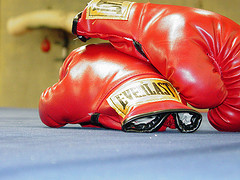 Given the hoopla it caused a few weeks ago, you may already be aware of the somewhat notorious ruling in the Obsidian Finance Group v. Cox case. That's the case where an Oregon federal judge rejected blogger Crystal Cox's contention that she was a member of the media, thus clearing the way for a $2.5 million verdict against her for defaming the plaintiffs.
Given the hoopla it caused a few weeks ago, you may already be aware of the somewhat notorious ruling in the Obsidian Finance Group v. Cox case. That's the case where an Oregon federal judge rejected blogger Crystal Cox's contention that she was a member of the media, thus clearing the way for a $2.5 million verdict against her for defaming the plaintiffs.
The story resulted in much hooting and hollering online, particularly from bloggers outraged that the judge ruled that they were not protected under Oregon's shield law. Though as CMLP guest blogger Eric Robinson pointed out, the shield law issue was a sideshow to a much bigger problem in the ruling: that Judge Marco A. Hernandez had ruled that the Supreme Court's decision in Gertz v. Robert Welch, Inc. does not apply to Cox because she is not "media."
Gertz stands for the proposition that plaintiffs in a defamation case cannot recover any damages without proof that the defendant was at least negligent, and may not recovered presumed damages without proof of the defendant's "actual malice." In Cox, the judge ruled that Gertz only applies to media entities, and – using a rather arbitrary list of what defines the media – determined that Cox was not a member of the protected class. This in spite of several cases (of which the judge took no notice and Cox, acting pro se, did not cite) that state just the opposite.
Well, Cox now has filed a motion for a new trial challenging the court's reasoning on omitting Gertz, and this time she's got some help: Portland lawyer Benjamin Souede and First Amendment scholar Eugene Volokh. Volokh's addition is particularly significant: besides being a First Amendment expert, he's also a serious blogger himself, overseeing and writing for the eponymous Volokh Conspiracy. There aren't too many better lawyers than Volokh to fight this sort of fight, I suspect.
In the motion for a new trial, Volokh and Souede are arguing that precedent clearly establishes that Gertz applies whether or not Cox is a member of the media, thus entitling her to a jury instruction establishing the burdens on the plaintiffs to prove liability and recover damages. Further, they argue, the plaintiffs should be treated as public figures, thus invoking the "actual malice" standard of New York Times v. Sullivan. Finally, they argue that Cox is entitled to a new trial, or at least remittitur, because the evidence provided to the jury did not support an award of $2.5 million in damages. The motion is available on our legal threat database entry on the case.
Of course, this is just the first punch in a new round in Cox; we've got a long way to go before we see a winner. But this'll definitely be one to follow in the coming months, as it looks like some of the judge's dubious rulings might finally get the review that they deserve.
Arthur is the research attorney and editor for the Citizen Media Law Project at the Berkman Center and a correspondent for The Christian Science Monitor. He tweets occasionally at @NominallyBright.
(Image courtesy of Flickr user KWDesigns licensed under a CC BY-ND 2.0 license.)




